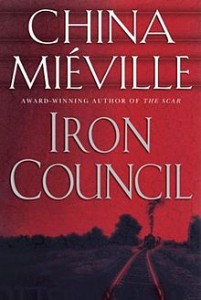The Iron Council
Miéville, China (Del Ray, 2004 ISBN: 0-345-46402-8)
One of my friends emailed me recently and said “Ok, I’m a quarter of the way through The Iron Council. Tell me it gets better.”
And I said, “Keep reading.”
And the next day she said, “WOW. THANK YOU!”
I knew what she meant. The first section of the novel can be confusing – I’ve known friends to discard the book before the plot starts to become cohesive. I’ve read reviews where people have disliked it; I suspect they also gave up early and didn’t keep going. If you keep reading, the brilliance starts to kick in and you end up engulfed in this wonderfully insane world with its insane physics and marvelous storytelling.
China Miéville makes his reader work hard – and I want to give him a big giant hug and yell THANK YOU into his bemused face for challenging the reader in such interesting ways. There isn’t anyone writing at the moment who even comes close to the sort of novel he can create. Yes I’m a fangirl, I have everything he’s written and certain novels of his I reread over and over. His is the only fantasy I really read (other than picking up the Belgariad series when I’m sick for the comfort reading**). I’ve been a Science Fiction devourer ever since I read Ringworld by Larry Niven in the early 90s – and it’s feels increasingly hard for me to find authors that are doing something different in that genre. I like Miéville because he writes fantasy as though it’s Science Fiction, it satisfies the SF need in me in a way fantasy typically does not. There is filth and machines and gears and industrialization elements; magically reshaping people to machines (or worse) for punishment (known as the ‘Remade’). Lots of oil and politics and rebellion.
Anyone who can write about gangs of youthful-angry-body-modding cactus creatures, but doesn’t make them cartoony, gets my vote.
He’s also clearly obsessed with cities. A main characters in all of his books is the city that the book is set in, even if that city is mobile (as there is in both this novel and Railsea), or static (his London, New Crobuzon). That sounds strange I know, but his fascination and enthusiasm adds a pinch of something that other authors just don’t do. I guess living in London could do that to you – give you a really odd perception about what a city is or could be, and Miéville reflects this in his writing. Miéville’s cities are living, self-aware places; they have souls. I wonder if those of us who grew up in suburban Australia quite get the point of that? The Melbourne I live in sleeps and dozes and trundles along, and it’s very easy to be here… I love Melbs but it’s a safe, controlled place, a city founded by middle managers and planned, not a place built on two thousand odd years of chaos and bones and trauma and history, as London is. London is inspiring and a bit mad and seething, London is in a punk band and does experimental art and drinks absinthe and smokes too much. Melbourne has nana-naps in the afternoon and drinks cocoa and makes crocheted blankets and takes the Labrador for a walk every day. I don’t feel I’d ever be inspired to make the Melbourne I know a character in a novel… I’d be too afraid it would put both you and the reader to sleep.
It was a hard choice which Miéville novel to review here. The first of his I’ve read was The City and the City – and that’s also the one I have reread the most. The most fun to read was Kraken (urban fantasy set in modern London) and the most difficult but probably also the most outstanding brilliant was Embassytown. My advice is to pick up any one of them and just give it a go.
**Ok. I lied. There is one other fantasy series I have liked a lot and do reread. I have this embarrassing liking for the Dragonlance books, the Twins novels in particular. Blame 15 year old me falling big time for Raistlin… who is a vile character really, but I have a lot of fondness for those books

